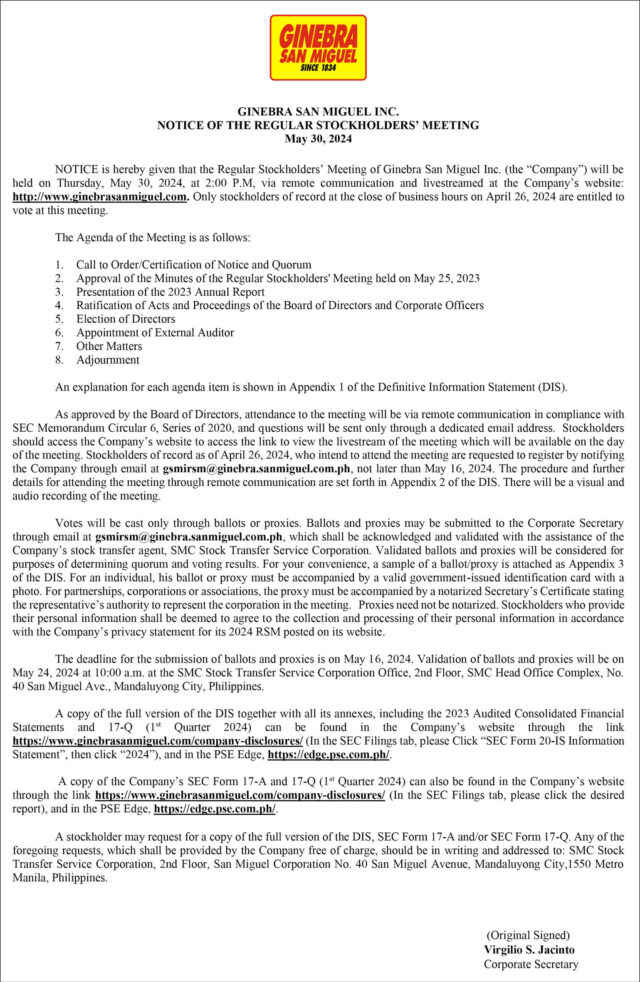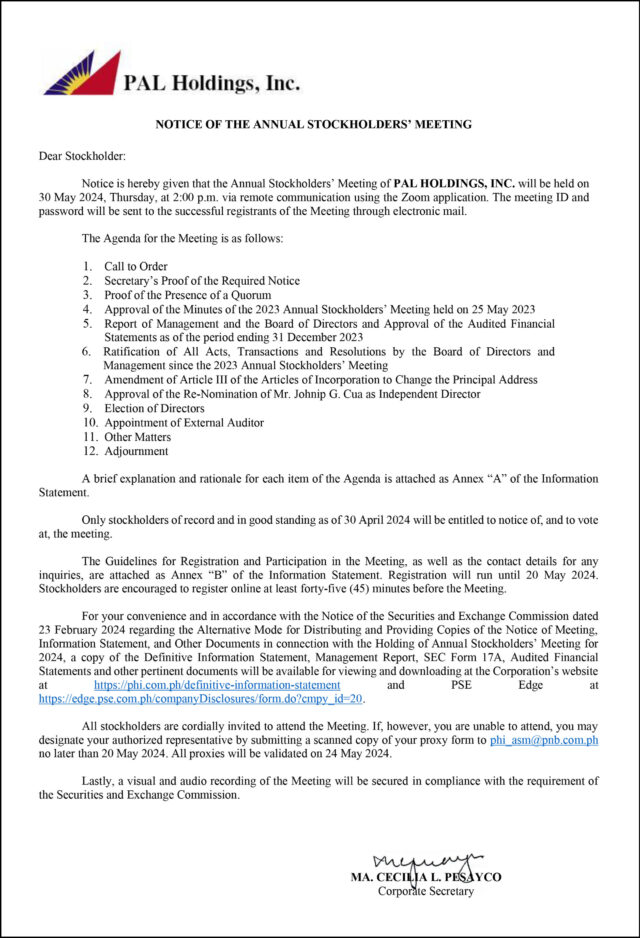By Luisa Maria Jacinta C. Jocson, Reporter
HEADLINE INFLATION picked up for a third straight month in April amid higher food and transport costs, the Philippine Statistics Authority (PSA) reported on Tuesday.
While the annual rise was below market expectations, it supports the Bangko Sentral ng Pilipinas’ (BSP) decision to maintain its hawkish pause, analysts said.
The pickup also “underscores the need for vigilance,” the National Economic and Development Authority said in a statement.

The consumer price index (CPI) quickened to 3.8% year on year in April from 3.7% in March, preliminary data from the PSA showed. Still, this was slower than the 6.6% print in the same month a year ago.
This was within the BSP’s 3.5-4.3% forecast for April CPI and marked the fifth straight month that inflation settled within the central bank’s 2-4% annual target range.
The April print was also below the 4.1% median estimate in a BusinessWorld poll of 16 analysts conducted last week.
Month on month, inflation inched down by 0.1%. Stripping out seasonality factors, month-on-month inflation picked up by 0.2%.
For the first four months, headline inflation averaged 3.4%, still below the BSP’s 3.8% full-year forecast.
“The inflation outturn is consistent with the BSP expectations that inflation could accelerate temporarily above the target range in the next two quarters of the year due to the possible negative impact of adverse weather conditions on domestic agricultural output and positive base effects,” the central bank said in a statement.
“Looking ahead, the Monetary Board will consider the latest inflation and first-quarter 2024 GDP (gross domestic product) outturns, among other information, in its upcoming monetary policy meeting on May 16. The BSP also continues to support the National Government’s non-monetary measures to address supply-side pressures on prices and sustain the disinflation process,” the central bank added.

The PSA will release first-quarter GDP data on May 9, Thursday.
Core inflation, which excludes volatile prices of food and fuel, slowed to 3.2% in April from 3.4% in the previous month and 7.9% a year ago.
April inflation was mainly driven by the faster annual increase in the heavily-weighted food and non-alcoholic beverages index, National Statistician Claire Dennis S. Mapa said.
The index jumped to 6% from 5.6% in the previous month but was slower than 7.9% a year earlier.
Food inflation alone accelerated to 6.3% from 5.7% in March. However, this was slower than the 8% print in the same month in 2023.
One of the primary contributors to faster food inflation was vegetables, tubers, plantains, cooking bananas and pulses, which rose to 4.3% from the 2.5% decline in the previous month.
Mr. Mapa noted a rise in onion prices. “We saw onion prices slightly increase in April. Compared to last year, it’s lower, but we saw an increase from March to April.”
PSA data showed that the average price of onion was at P126.50 per kilo outside the National Capital Region (NCR) in April. Within the region, it averaged P90.30 per kilo.
The cereals and cereal products index was also a major contributor to food inflation, rising by 16.9% in April. This was slower than 17.3% a month ago but faster than 5.4% a year prior.
Rice inflation surged by 23.9% in April. However, this was slower than 24.4% a month prior.
“Rice has a substantial contribution, it contributed around 46.2% to overall inflation. In the 3.8% inflation rate, it contributed around 1.75 percentage points,” Mr. Mapa said.
The slight easing in rice inflation is attributable to the decline in world rice prices, he said.
“What we saw is that world prices of rice are going down slightly. It peaked in January and then it went down in February and March. That may have an impact on the decline of prices of rice,” Mr. Mapa added.
PSA data showed that prices of well-milled and special rice saw decreases on a month-on-month basis in April, while regular-milled rice posted an increase.
The average price of a kilo of well-milled rice dropped to P56.42 in April from P56.44 a month ago while special rice averaged P64.68 from P64.75. Meanwhile, regular milled rice rose to P51.25 from P51.11 in the previous month.
April inflation was also driven by faster increases in transport prices, the PSA said.
Transport inflation rose to 2.6% from 2.1% in the previous month and matched the 2.6% print a year ago.
This was primarily due to the faster rise in prices of diesel and gasoline, Mr. Mapa said.
Diesel quickened to 4.2% in April from the -0.1% print a month ago while gasoline accelerated to 3.3% from 0.8% in March.
In April, pump price adjustments stood at a net increase of P2.25 a liter for gasoline and P0.50 a liter for diesel.
Meanwhile, the inflation rate for the bottom 30% of income households quickened to 5.2% in April from 4.6% in the previous month. This was slower than the 7.4% print a year ago.
In the first two months, the inflation rate averaged 4.4% for the bottom 30%.
In the NCR, inflation slowed to 2.8% in April from 3.3% in March. Inflation in areas outside NCR accelerated to 4.1% from 3.8%.
INFLATION, POLICY OUTLOOK
The BSP said risks to the inflation outlook remain tilted to the upside.
“Possible further price pressures are linked mainly to higher transport charges, elevated food prices, higher electricity rates, and global oil prices. Potential minimum wage adjustments could also give rise to second-round effects,” it said.
Still, the central bank said it expects the inflation average to be within its target for this year and next.
Headline inflation averaged 6% in 2023, marking the second straight year that it breached the BSP’s annual goal.
“Inflation will likely continue to trend upwards and could possibly breach the target in mid-2024 due to unfavorable base effects unless there are significant price reversals,” Chinabank Research said in a report.
It cited weather conditions such as the El Niño dry spell and the emergence of the La Niña, which could affect local rice production.
As of April 30, agricultural damage due to the El Niño reached P5.9 billion. Rice was the most affected crop, accounting for 53.21% of total agricultural damage, equivalent to P3.14 billion.
Pantheon Chief Emerging Asia Economist Miguel Chanco said the uptick in April inflation was driven by the acceleration in food inflation, which will continue to persist.
“This statistical boost will persist in May — likely pushing the headline up temporarily and marginally above the 4% upper-bound of the BSP’s target range — before unwinding substantially from June to September,” he said in a note.
Following the April CPI print, analysts expect the central bank to keep borrowing costs steady for a fifth straight time at its meeting this month.
“(The) inflation report lessens the pressure on the BSP to resort to additional tightening to fend off price pressures,” ING Bank N.V. Manila Senior Economist Nicholas Antonio T. Mapa said.
“BSP Governor Eli M. Remolona, Jr. believes monetary policy settings are appropriate and we expect BSP to retain all policy settings at their policy meeting on May 16,” he added.
The Monetary Board in April kept its benchmark rate at a near 17-year high of 6.5% following cumulative hikes worth 450 basis points from May 2022 to October 2023 to help bring down inflation.
Rizal Commercial Banking Corp. Chief Economist Michael L. Ricafort said April inflation settling within the BSP’s target for the fifth straight month could support rate cuts later this year.
Mr. Chanco added that rate cuts could begin at the Monetary Board’s June 27 meeting.
“This call is also based on the assumption that Thursday’s first-quarter GDP report will disappoint markedly, ultimately weighing more on the Board’s thinking next month over a likely short-lived breach of its inflation target in the May CPI report,” he said.
A BusinessWorld poll of 20 economists and analysts conducted last week yielded a median GDP growth estimate of 5.9% for the first quarter.
“We maintain our view that full-year inflation would settle within target this year, which would give room for the BSP to begin its monetary easing cycle, likely at the final quarter of the year,” Chinabank Research added.















